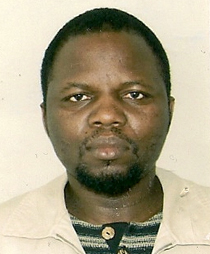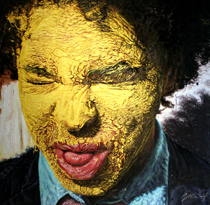“Aiwa, aiwa – No, No. You have got it wrong. These whites are not here to, â€Jeremiah cut in.
“How well do you know whites?â€, Choso asked pointing his finger at Jeremiah. “I worked for them for many years until my hair turned grey. It is you young fools who think they are Gods to be worshipped.â€
“I also lived with whites. I worked in Joburg, Durban…â€
“As a spiv-ta!â€, Choso shouted sarcastically. “Was that your job when you lived in town?â€
“It is you who lived by robbing people.â€
“Did I rob your mother of her knickers?â€
“What! How dare you insult my mother you bastard,†Choso said, glaring at his rival. “You have wool between those big ears of yours and not brains like me! You good for nothing imbecile,†he shouted, saliva flying from his mouth. “You could make a very good candidate for a policeman or even to be a white man’s dog. You come here to insult my innocent dead mother and me. For what!? For what!?â€
Jeremiah could not stand the salvo. He stood up heading for Choso, his fists clenched. Several men held him, calming him down by invoking his son’s name, Nyasha. ‘Aiwa don’t fight, Father of Nyasha. We are only having a friendly discussion.â€
“Mhata yako – arsehole! I can break the other good leg if you think I am afraid of you. I don’t fear you like the other villagers,†Jeremiah shouted, but he was dragged away by the other men.
Jeremiah and Choso had always been at loggerheads because both of them tried to outdo each other in reliving their experiences in town. Choso also suspected that Jeremiah was interested in Ma Chido.
Shingi only understood why his father hated white people at his deathbed. One day, his father, who had been bedridden for months, called for him. He was groaning on his reed mat. There were several bottles of traditional medicines that he had been taking. There were calabashes and gourds full of medicines and strange paraphernalia. The room smelled of decay and death. Someone had told Shingi that when one was dying, his ancestors held court unseen on his deathbed, discussing when he should join them. He had dismissed the story, but he now believed it when he felt a strange presence in the hut.
“Shingi, is it you,†his father called out weakly. “Shingi, the drop of my own liquid. You know Shingi…†He was seized by spasms of coughing, which racked his already worn body. He was a shadow of his old bulky self. His ribs showed through the thin bed sheet that covered his now thin body.
“People think I am bad.â€
“Not everybody father. We love you as a familyâ€
“Really? …I know, they think I am a monster but they don’t know who I am. Inside I am a kind person. Only your mother knew me well before the ancestors called her home. I changed when I came into contact with varungu – whites. I am dying without understanding them. They have also chosen not to understand us Africans. We cannot live together as brothers and sisters. Never! It is like mixing oil and water. However, I understand their cruelty and disregard for other races that are not white. Oh yes I do. I also do understand their hypocrisy. I worked for this white man…. Mr Cook. No Mr Cook was my first one, then Mr Petersen… Oh I remember it was Mr Van Meer. I worked for him for many years and when I got old he chased me like a dog, giving me only a small amount of money, and when I complained he threatened to call Police to arrest me. I dared him to go ahead. He said I was a cheeky kaffir and hit me with a sjambok. He broke my leg and nearly killed me with beating. I called out to my ancestors because I thought I was dying. He later called the Police and lied that I had tried to kill him. I was taken to hospital and later imprisoned. Upon release I was stranded and had not chitupa – pass – to stay in town. I came back here with your mother and your elder sister Rambanai. With my handicap, I managed to start life afresh. I am telling you this not only because I am bitter about what happened but because I have seen the same streak of violence and rebellion in you. Outside you look humble, the qualities you have inherited from your mother, but inside you have my character – that of a stubborn person with a streak of violence – which you try to suppress. I have seen this in your eyes when I am shouting at you. I know you can obey orders but you do it with a scorn in your eyes that masks rage. I have always stopped you from going to work in town. I am now granting you permission to go after I die. Promise me one thing though: that you will be obedient to whites. I am not saying this because I am a coward but because I have had enough experience to realize the powers they wield over Africans. Even Africans like policemen, priests, clerks and even houseboys who work for them attain this mysterious power. Always say things that will please them. They are like children: you can fool them easily, but don’t try to be clever and challenge their authority. They can sense rebellion more quickly than flattery.â€
He groaned and reached out his hands for Shingi’s face. He spat into his son’s face in a traditional blessing. Choso lay back on his mat, beads of sweat glistening on his face. Shingi tried to open his mouth to speak but his father stopped him with a wave of his bony hand. Shingi left the room tears welling in his eyes.
Two days later his father was dead. The household and harem that he had kept together fell apart quickly. Ma Chido eloped with Jeremiah to Salisbury, taking her daughter with her. Another mainini, Ma Tapiwa, went to live with her mother in Chitungwiza. Ma Farai inherited some oxen from her husband and eked out a living by tilling the land. Shingi waited for a month, and left for Salisbury to look for a job. He had only been in school up to Standard Two.
In Salisbury Shingi had bumped into Ma Chido several times in shady places like Mapitikoti beerhall. She hung out there with other loose women who indulged in casual sex. Ma Chido also sold chikokiana – local traditional brew- and had aged, and since age and beauty don’t mix, she now looked haggard, a shadow of her former beautiful self. Jeremiah had abandoned her shortly after arriving in Salisbury. He had been in and out of prison. This time he was serving a lengthy sentence for burglary.
Thoughts about his father brought up memories of his own experiences in the town. Shingi had pushed them to the back of his mind; they now rushed to the fore and saddened him. He had worked for the Johnsons for many years without any serious incidents. In following his father’s advice, he had masked his anger by working hard, cushioning himself from the countless injustices he faced. Now Mr Johnson was dead and Shingi was trapped with the man’s cantankerous wife who treated her servants like mules.
Shingi woke up late and rushed to have a quick shower. He wore his uniform: a pair of white shorts and a shirt to match. He had scrubbed his armpits and groin. Mrs Johnson had once told him to his face that he stank. Jackson had showed him how to bath properly.





No Comments so far ↓
There are no comments yet...Kick things off by filling out the form below.